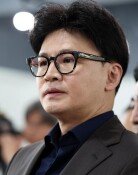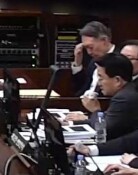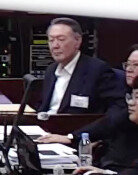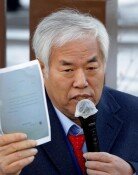Lees Election Bringing Freedom of Speech Back to Korea
Lees Election Bringing Freedom of Speech Back to Korea
Posted December. 24, 2007 06:27,
Roh administration officials trying to appease reporters anger
A senior official in charge of press affairs called the Dong-A Ilbo and said Saturday, insisting on anonymity since Rohs presidency is not over yet, We badly wish we could open the pressrooms again as before. Our frequent contacts with reporters will help the public understand the government policies and activities better.
He confessed, Under the Roh administration, we cannot talk with reporters of Dong-A, Chosun and other major newspapers. It has been really tough for us.
Roh has strictly penalized those government officials who have sat down for interviews with or acted as sources for conservative newspapers. The Dong-A Ilbo is on the top of Rohs blacklist.
The Ministry of Information and Communication is unofficially looking forward to the upcoming re-opening of the currently shutdown pressrooms. The ministry has its own building apart from the integrated briefing room at the government complex across from Sejong-ro.
A senior ministry official said on the condition of anonymity, When [President-elect] Lee meets President Roh, we hope things are worked out and new guidelines are released.
The ministry originally had its pressroom on the 13th floor of its building. After it was shut down, the ministry has been using the room as a storage place. A considerable number of ministry officials have made unofficial and secret preparations for the re-opening of the room as the possibility of Lees winning the last election became higher.
Police still enforcing anti-free speech measures
The National Police Agency, which expelled reporters from the pressroom by force on December 12, has not budged a bit yet. Correspondents covering the agency had used a corner of the agencys building lobby in Seoul to send out reports.
Likewise, forced out of the pressroom on December 13, reporters covering the Seoul Police Agency have used a small room in the basement of the agencys headquarters in Jongro-Gu, Seoul.
The regional agencys spokesperson Chung Cheol-su confirmed its stubborn position last Friday, saying, The Government Information Agency has not directed us otherwise. We cannot and will not make any accommodations.
Beneath the strong appearance, senior law enforcement agents who have spearheaded the anti-free speech policy have been on pins and needles watching Lee Myung-bak win the presidential election.
For example, some senior police officers who had vehemently rejected phone calls and interview requests from reporters, started visiting the basement pressroom from December 20, or one day after the presidential election.
A high-ranking official confessed, I cannot run against the directions of my boss [i.e. Police Commissioner Lee]. Things have changed, and will be better in the future.
In the meanwhile, other agencies such as the DAs office and the Tourism Ministry have not made any official changes, and simply said, We will abide by new guidelines if we get any.
Some correspondents starting to attend briefings
Ministry of Economy correspondents started attending official briefings from December 20. They had boycotted the briefings in protest of the forceful shutdowns.
In a statement, the reporters explained, We have opposed the anti-press measure disguised as the Advanced Media Support System. Now that Lee [Myung-bak] has won the election, things will change in the very near future. Thus, we have to relay various types of information to the public to satisfy their demand for thorough coverage of the next administrations economic policies.
Correspondents covering other agencies will hold their own meetings soon to determine whether to attend the briefings.
On the other hand, the Ministry of Labor correspondents publicly made clear that they would not attend the briefings unless the ministry opens the pressroom again.







